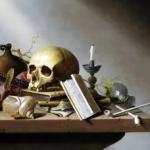
For nothing worthy proving can be proven,
Nor yet disproven,
Wherefore thou be wise,
Cleave ever to the sunnier side of doubt
Lord Tennyson[i]
Since leaving the mindset of Fundamentalism, I have been drifting out of the certainty of knowledge into a healthier balance of doubt. My previous worldview was a theocentric revelational view of knowledge rooted in an absolute paradigm that truth is found in one’s traditional interpretation of the religious revelation. My current worldview is quite different, the Naturalist scientific view of knowledge rooted in the principle of rational scientific critical analysis based on questioning, testing, and verification. To be honest, I am still struggling on a daily basis to free myself from the force of my past traditions, the tyranny of my own passions to “be right” and the urge to absolutize beliefs and opinions. This may be an oversimplification, but as I see it, Fundamentalism focuses on certainty of belief and obedience to the articles of dogma, while Naturalism focuses on doubt and the continual search for scientific answers. Most of my life, I lived in the illusory realm of having complete certainty of my beliefs; presently, I am trying to live my life with a new principle: doubt.
As a Fundamentalist Pentecostal preacher, I proclaimed the necessity of absolute faith – absolute “certainty” about religious beliefs and that doubt was the opposite of faith, the ultimate sin. Usually after every sermon, I would give an altar call always asking the same question: ”If you were to die tonight, would you be absolutely-certain, you would go to heaven?” Looking back, what haunts me, is the phrase “absolutely certain,” revealing the fundamentalist mindset. There was no room for doubt. Today in Evangelical-Fundamentalist Christianity, doubt has been demonized and this demonization of doubt has done considerable damage to our spiritual growth and evolution. Doubt is demonized when we deify and absolutize a religious claim thereby, suppressing criticism and the honest search for answers.
My attitude since has changed to a healthier attitude of some degree of skepticism. Doubt is no longer a taboo but a stimulus, a goad encouraging me to search for more questions and answers. I am now secure in recognizing that I am only human and I do not have all the answers; which is a far cry from where I use to be, as a Fundamentalist, thinking I had all the answers. One of the components of Spiritual Naturalism is intellectual humility – which means:
“We believe in a humble approach to knowledge. With humility, we can recognize that human beings are imperfect in their ability to know all things. Therefore, we are careful to limit our claims about reality to what we can experience and measure, as well as reproduce and show to others. On all else, we are content to admit “we don’t know”.” [ii]
I am now free to admit without shame “I do not know.” There are several other critical thinking principles that I have put into practice in this search for answers. I am grateful for the writings of Bertrand Russell, 19th Century Philosopher and his principles of “critical undogmatic receptiveness” and “intellectual sobriety” which rejects certainty (the demand for which he calls an intellectual vice) and ensures that open-mindedness does not become mindless.
“The quest for certainty blocks the quest for meaning. Uncertainty is the very condition to impel man to unfold his powers.” [iv]
Some rules on Critical Thinking: [iii]
- Do not regard anything that one accepts as certain but only as probable.
- Begin forming my own opinions instead of relying on traditions and other authorities.
- Readiness to examine my beliefs with an open mind, taking into account and accepting all relevant and new evidence against previous beliefs, a willingness to examine both sides (unbiased) and discard a belief/hypothesis that has proven inadequate or unhealthy.
- Learning to recognize and control my bias, which is not easy.
- Viewing my beliefs with detachment
- Avoid being defensive when my beliefs are challenged
- Willingness to acknowledge my mistakes
- A willingness to adapt to the facts of the world
- Hold on to my beliefs with a degree of conviction warranted by evidence.
Growing up, I was not taught how to think critically, but to believe unquestioningly. I am now learning late in life how to live rationally, as I should, as I am a rational animal.
Learn about Membership in the Spiritual Naturalist Society
__________
The Spiritual Naturalist Society works to spread awareness of spiritual naturalism as a way of life, develop its thought and practice, and help bring together like-minded practitioners in fellowship.
NOTES:
[i] From The Ancient Sage, by Alfred Tennyson
[ii] Spiritual Naturalist Society Website-https://www.snsociety.org/what-is-sn/
[iii] Russell, Bertrand Russell Skeptical Essays (London, George Allen & Unwin Ltd, 1928)
[iv] Fromm, Erich Man for Himself (NY, Henry Holt & C0. 1947)
BIO: Guest writer Edward Kelly Jr. lives in Red Oak, Iowa, with his wife Rose. He was a Fundamentalist Pentecostal preacher for 20 years and in 1995 began a journey out of fundamentalism through the influence of such writers as Paul Tillich and James Barr. He has a Masters in Theology from Franciscan University (Steubenville, Ohio) and is now a Humanist Chaplain and Celebrant.

















